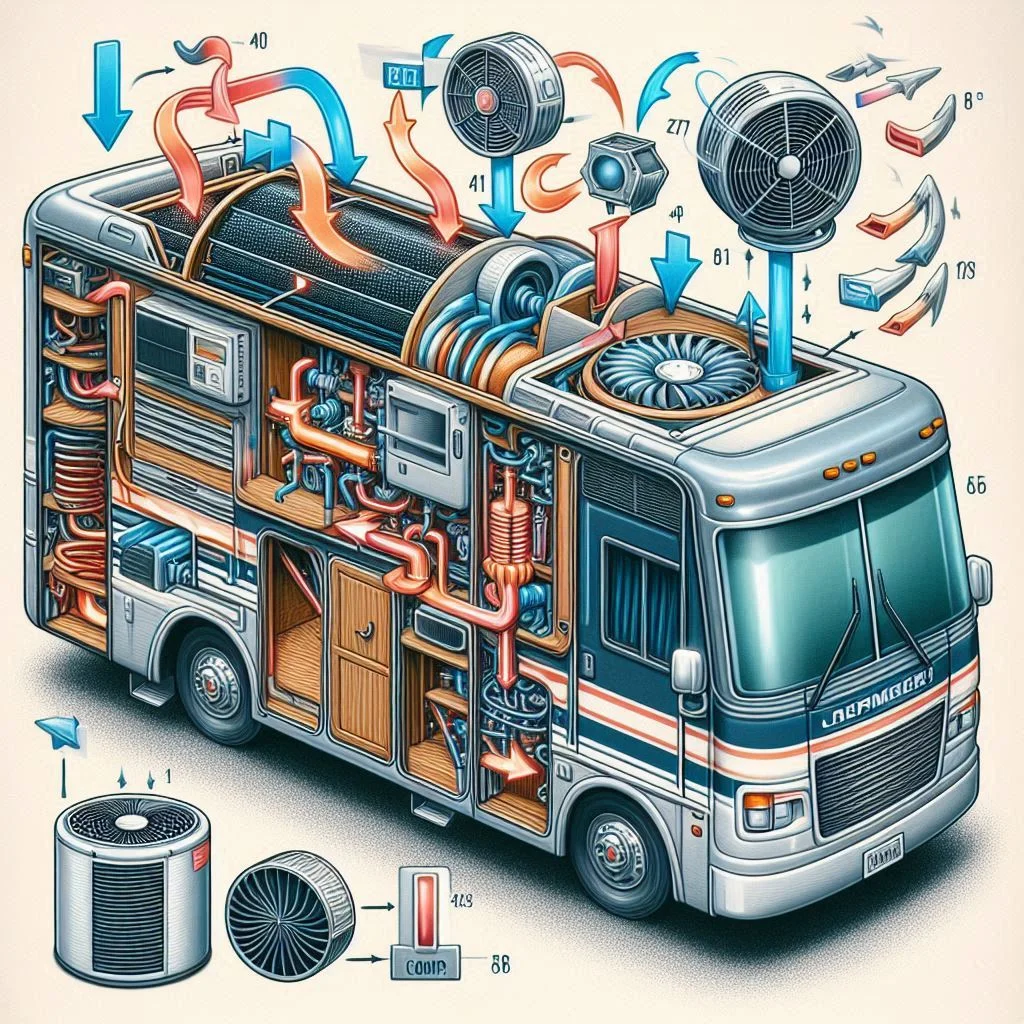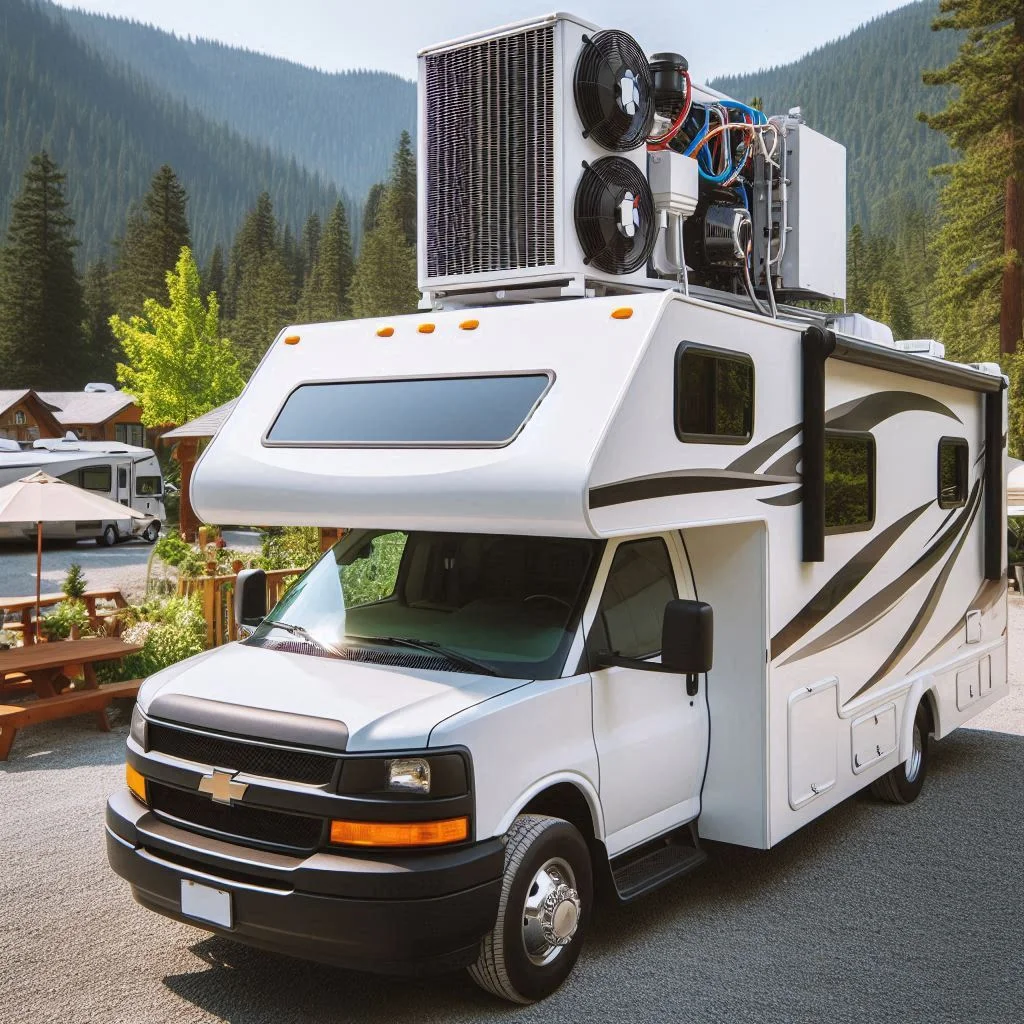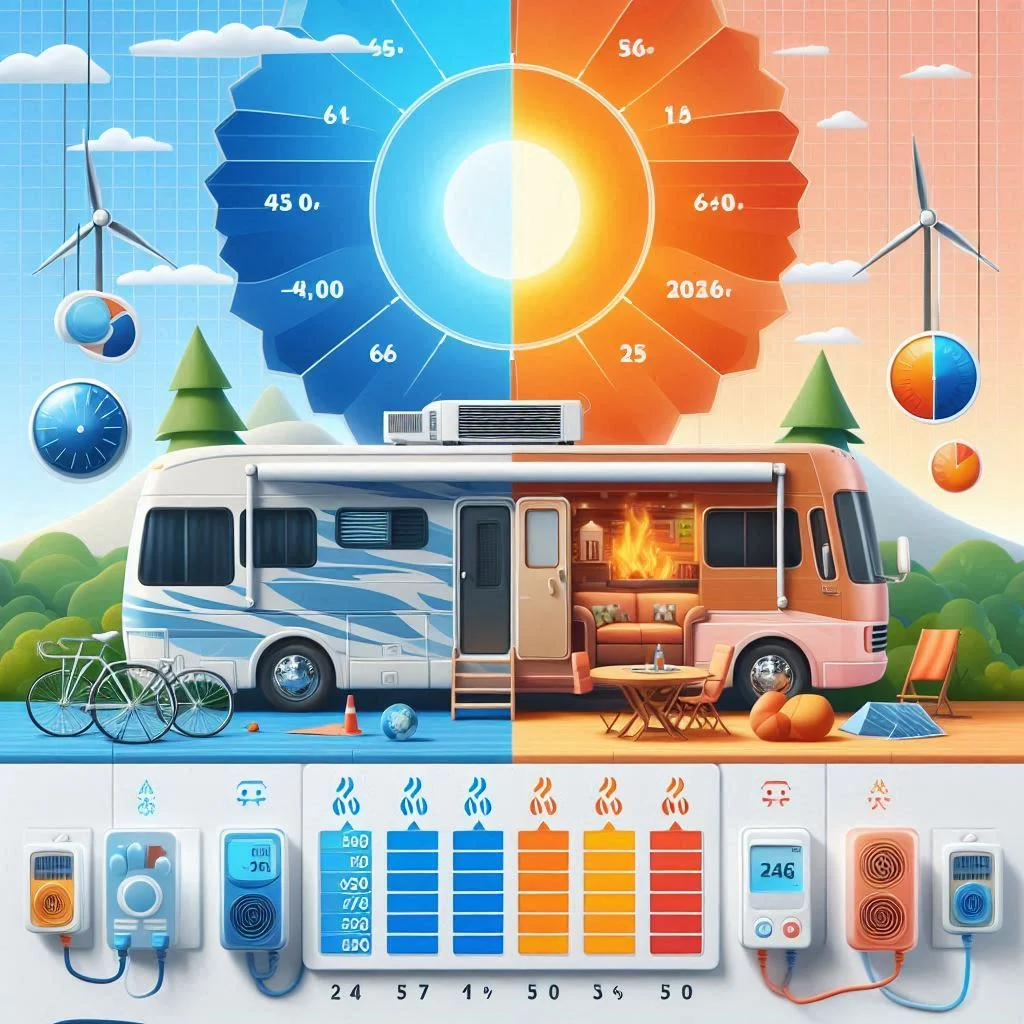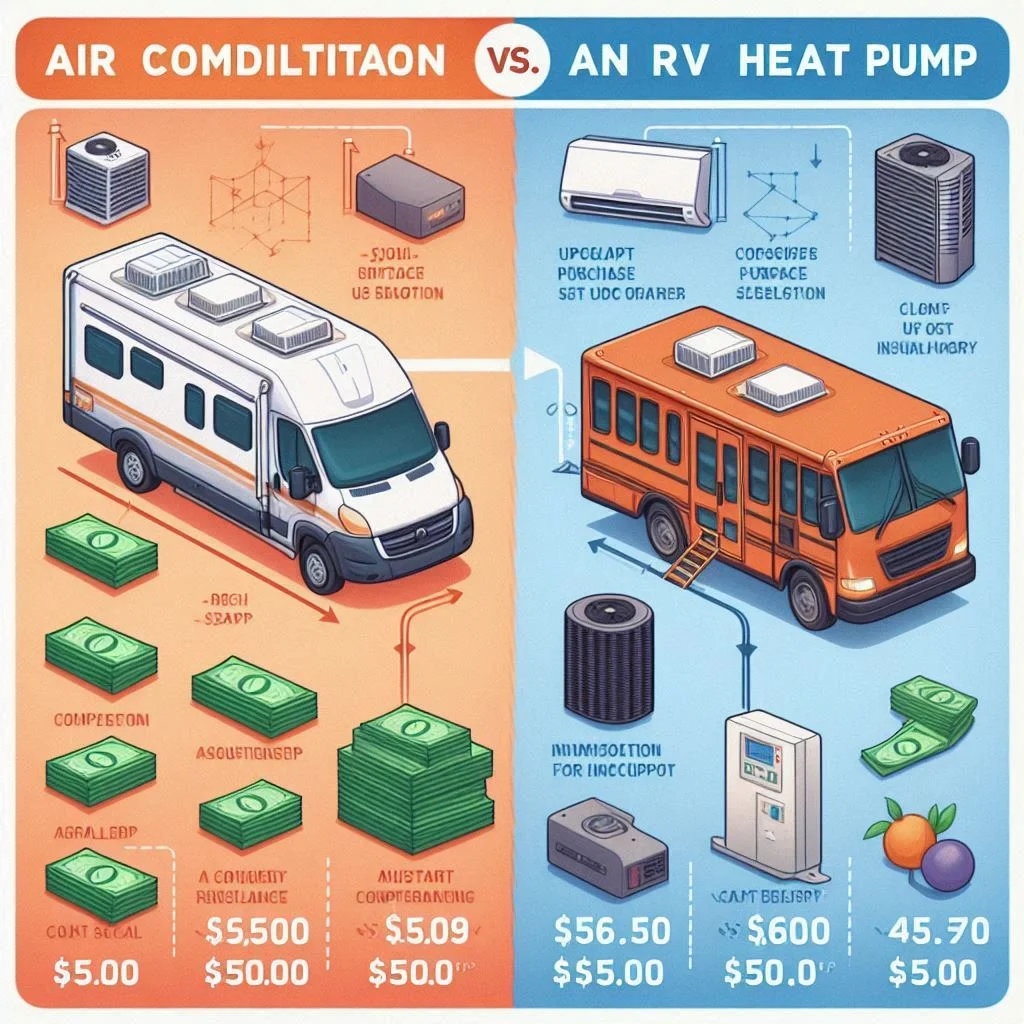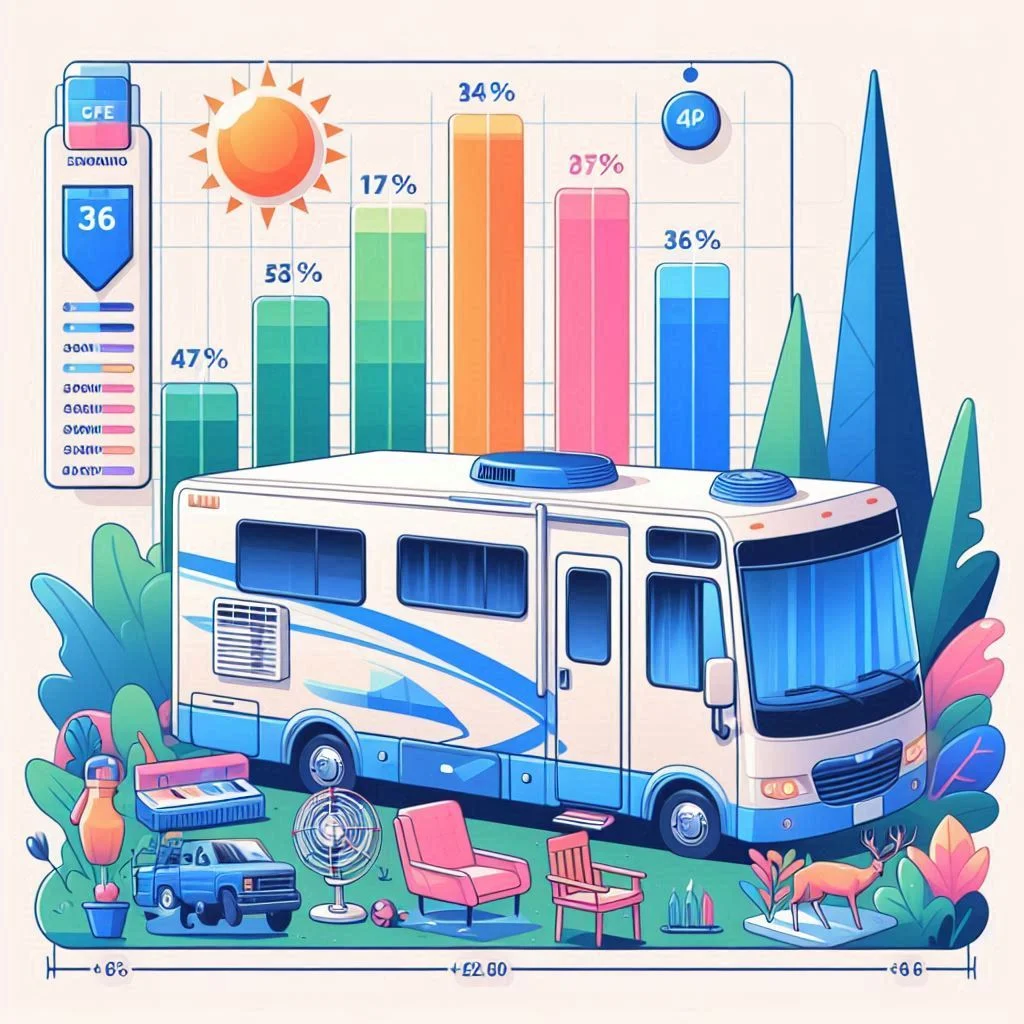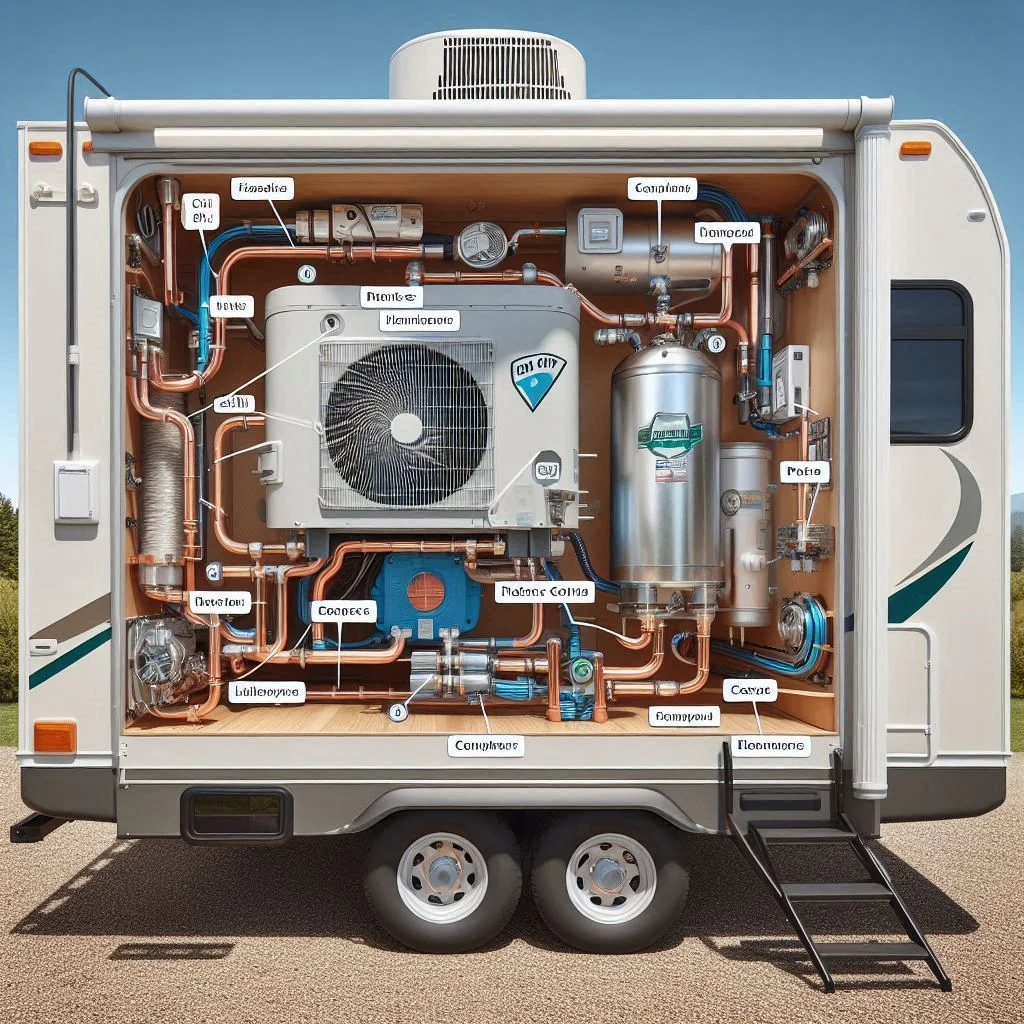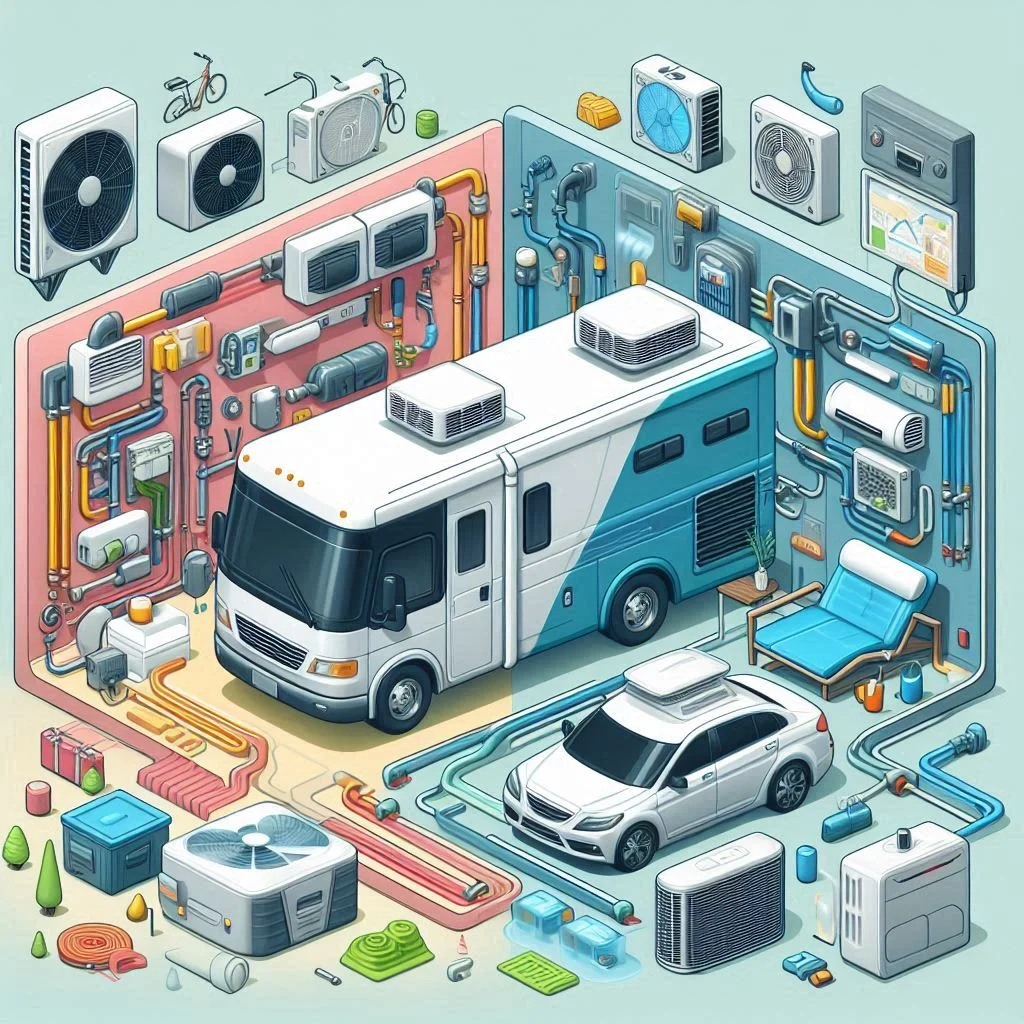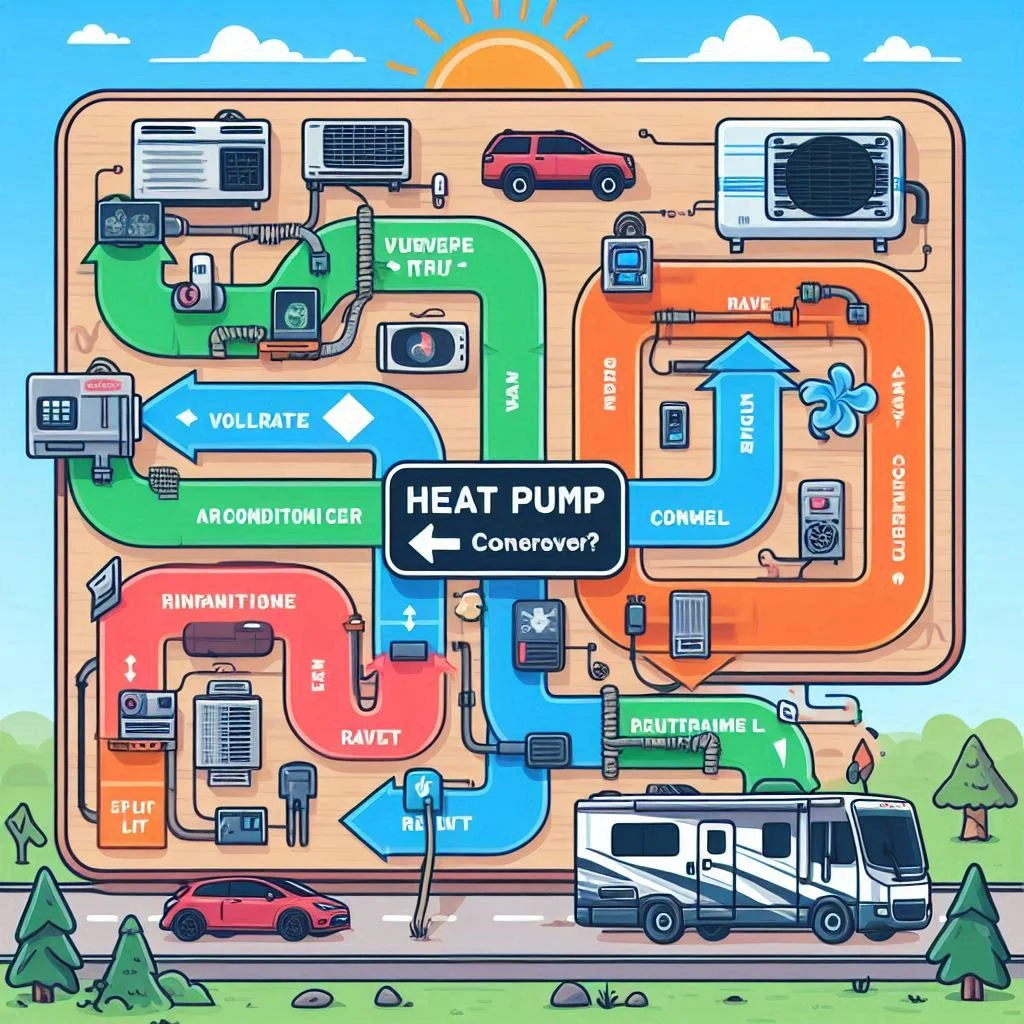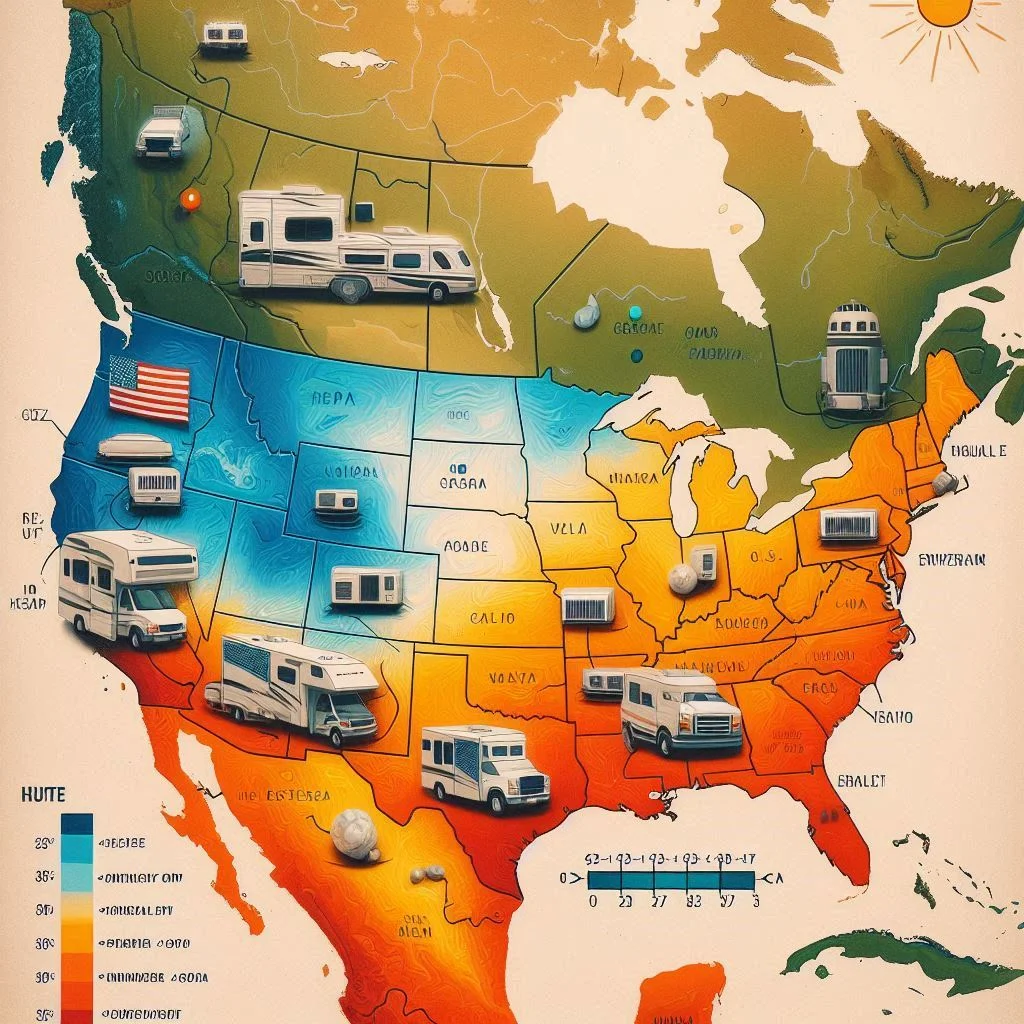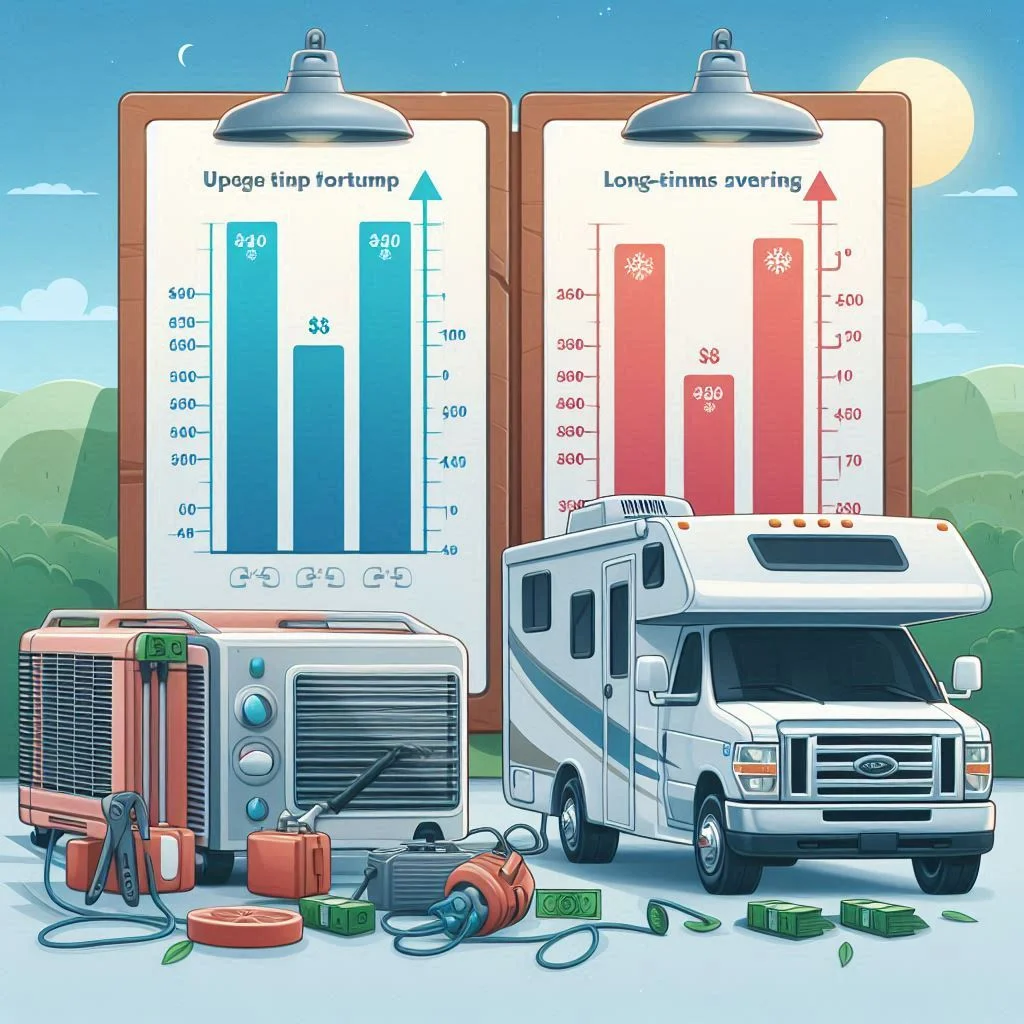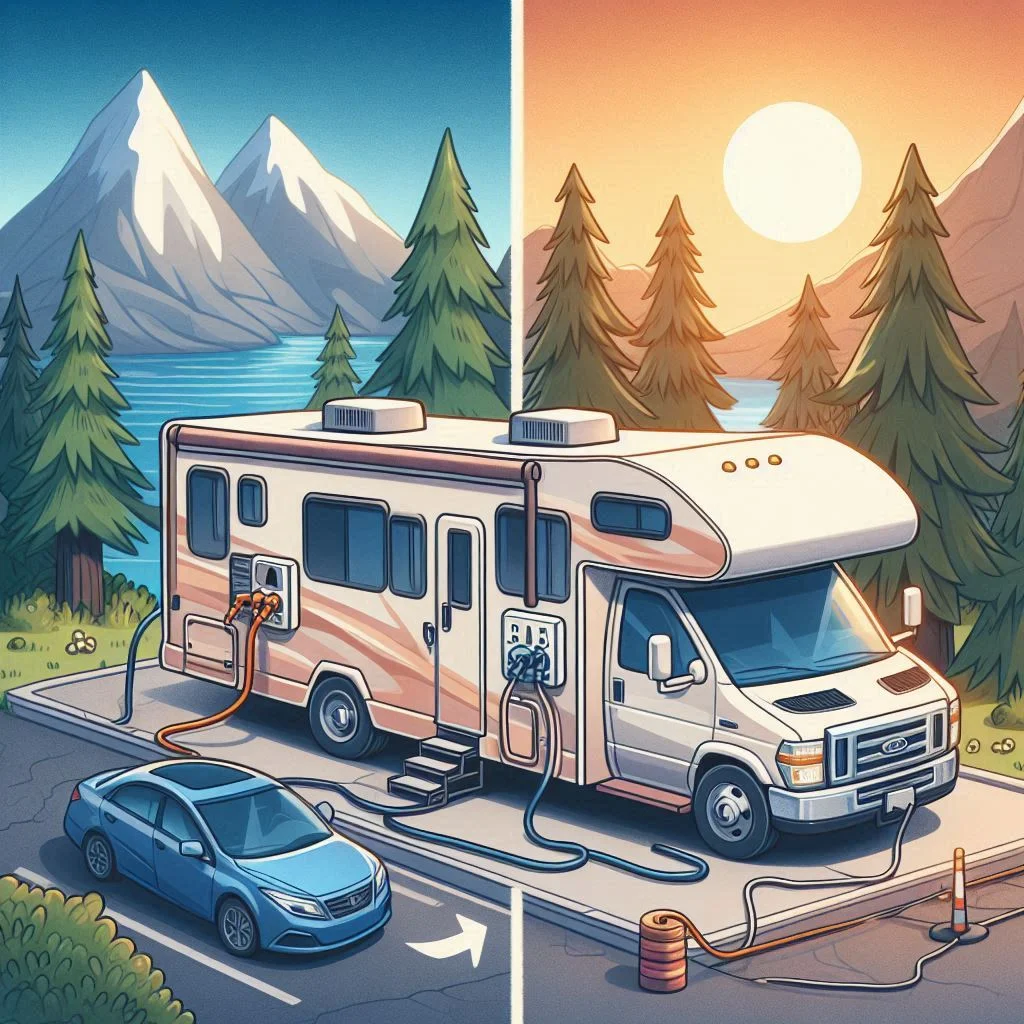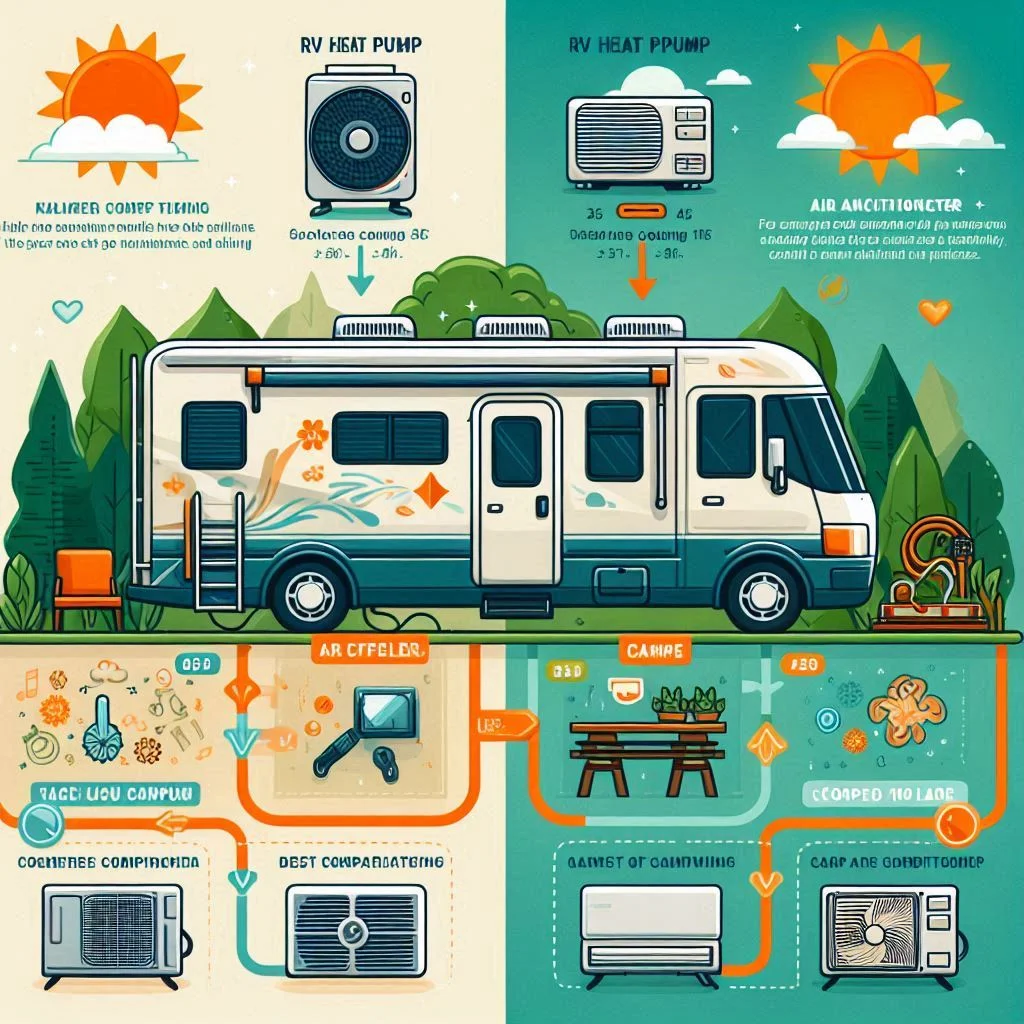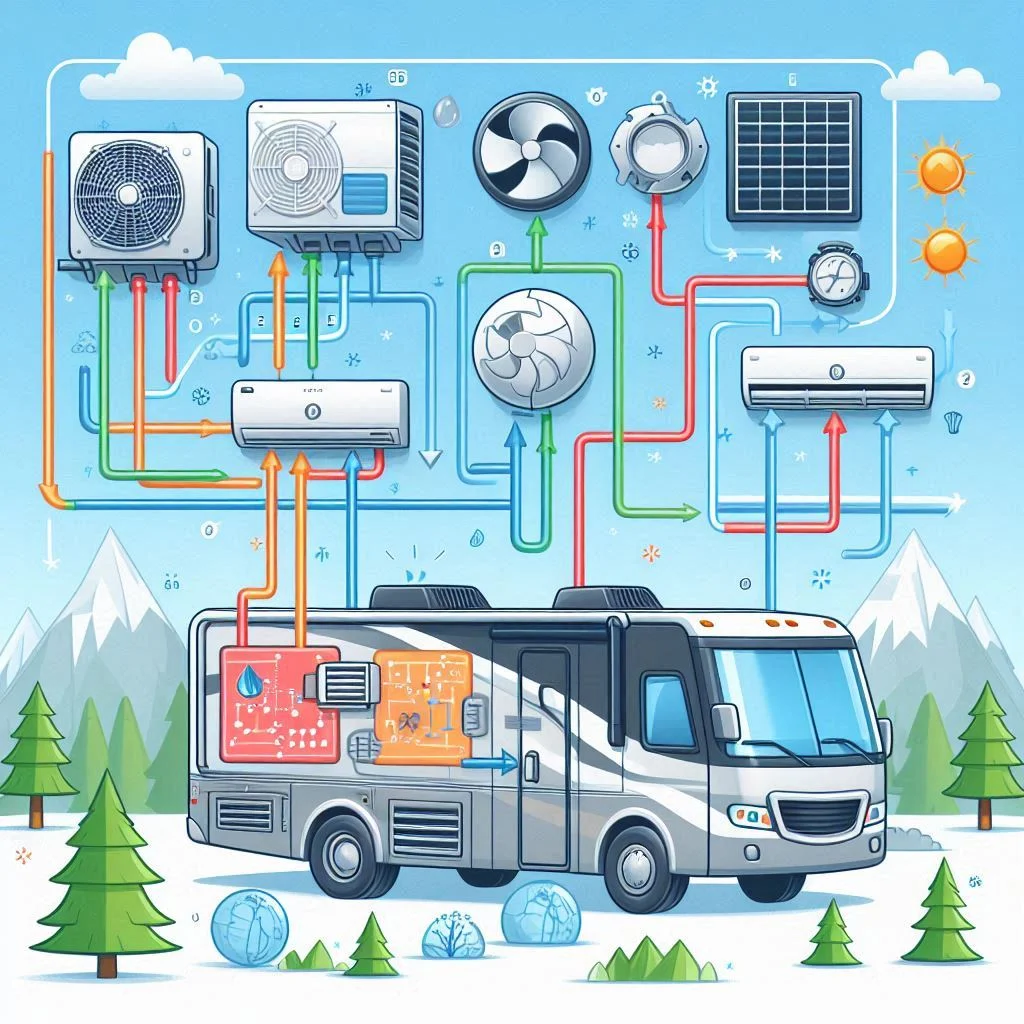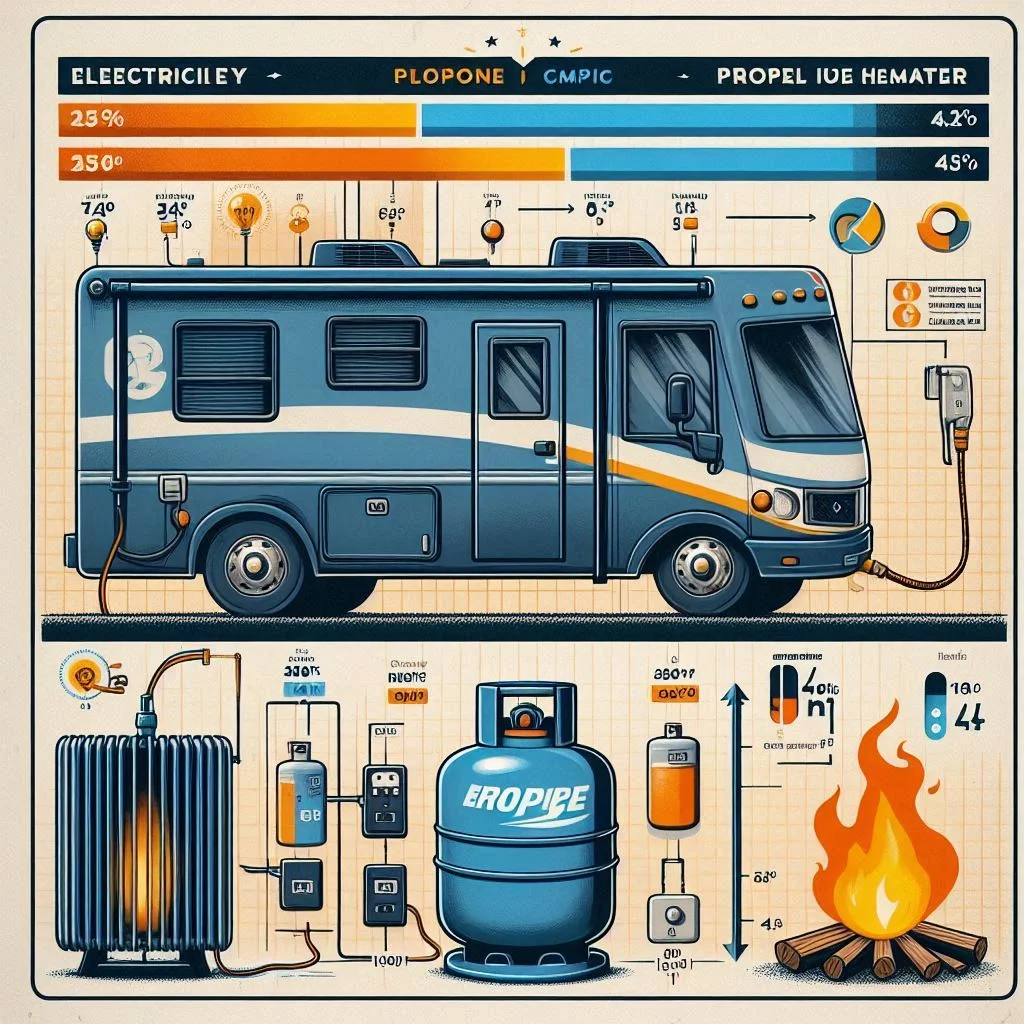RV Heat Pump vs Air Conditioner: Key Differences
If you’re considering climate control options for your RV, you might be asking yourself about the differences between an RV heat pump vs air conditioner. Knowing the key differences can help you make the best choice for your cooling needs. In this blog, we will dive into the features, benefits, and drawbacks of each system, ensuring you have the information necessary to choose the right option for your RV.
When it comes to maintaining a comfortable temperature in your RV, choosing between a heat pump and an air conditioner is a crucial decision. Both systems have unique benefits and work differently to regulate indoor temperatures. Understanding their functions, efficiency, and suitability can help you determine the best option for your RV lifestyle.
Understanding How an RV Air Conditioner Works
An RV air conditioner (AC) is designed to cool down the interior of your vehicle by removing heat from the air and expelling it outside. Unlike heat pumps, an air conditioner does not provide heating; its sole function is to lower the temperature inside the RV.
How Does an RV Air Conditioner Function?
- Heat Absorption: The evaporator coil inside the AC unit absorbs heat from the RV’s interior air.
- Refrigerant Cooling Cycle: The refrigerant inside the coil absorbs heat and turns into a gas.
- Heat Expulsion: The refrigerant gas moves to the compressor, where it is pressurized and passed to the condenser coil.
- Hot Air Release: The condenser coil releases the heat outside the RV, while the remaining cool air is blown back inside using a fan.
Benefits of an RV Air Conditioner
✔ Efficient Cooling – Designed specifically to handle high outdoor temperatures.
✔ Long Lifespan – If maintained well, RV AC units can last many years.
✔ Reliable in Humid Climates – Great for areas with high humidity, where a heat pump may not be as effective.
How an RV Heat Pump Functions
Unlike a traditional RV air conditioner, an RV heat pump can both cool and heat your vehicle. It works similarly to an AC unit when cooling, but it has a reversible valve that allows it to extract heat from the outside air and bring it inside during colder temperatures.
How Does an RV Heat Pump Work?
- Cooling Mode: Functions just like an RV air conditioner, pulling heat from the interior and releasing it outside.
- Heating Mode: Uses refrigerant to extract heat from the outside air, even in cool temperatures, and transfers it inside.
- Reversing Valve Activation: When set to heat mode, the system switches directions, allowing warm air to be circulated inside the RV.
Advantages of an RV Heat Pump
✔ Dual Functionality – Provides both cooling and heating in a single unit.
✔ Energy Efficient Heating – Consumes less power compared to propane or electric heaters.
✔ Eco-Friendly – Uses ambient heat rather than generating heat from combustion.
Limitations of an RV Heat Pump
- Not Effective in Extreme Cold – Works best in temperatures above 40°F (4°C).
- Higher Initial Cost – More expensive than a standard AC unit.
- Requires More Maintenance – Components like the reversing valve and defrost cycle need upkeep.
Key Differences Between an RV Heat Pump and Air Conditioner
When deciding between an RV heat pump and an RV air conditioner, it’s important to understand their fundamental differences. While both systems provide cooling, a heat pump offers the added advantage of heating—but each has its own performance characteristics, energy efficiency levels, and ideal use cases.
Heating and Cooling Capabilities
One of the most significant differences between an RV heat pump and an air conditioner is their ability to provide heating in addition to cooling.
RV Air Conditioner: Only Cools the Air
An RV air conditioner is a single-function unit designed solely to cool your RV interior by removing heat from the air and expelling it outside. It does not provide heating.
How It Cools:
- Heat Absorption – The evaporator coil absorbs indoor heat.
- Refrigerant Circulation – The refrigerant carries heat away and compresses it into a high-pressure gas.
- Heat Expulsion – The system expels heat outside, cooling the RV interior.
✔ Best for RVers traveling in warm climates where heating isn’t needed.
✔ Provides powerful cooling even in high humidity.
RV Heat Pump: Cools and Heats
An RV heat pump works like an air conditioner in cooling mode but has an added reversing valve that allows it to provide warm air in colder temperatures.
How It Heats:
- Extracts Heat from Outside Air – Even in cool weather, the heat pump absorbs heat energy from the air.
- Compresses and Transfers Heat – The refrigerant compresses the absorbed heat, increasing its temperature.
- Distributes Warm Air Inside – The system circulates the heated air into the RV’s interior.
✔ Great for mild winters or cool fall temperatures (above 40°F/4°C).
✔ Energy-efficient alternative to propane or electric RV heaters.
Energy Efficiency and Performance
Both systems use electricity to operate, but their energy consumption and efficiency vary based on usage, climate conditions, and insulation.
Energy Consumption
- RV Air Conditioners run continuously in hot weather, consuming more power than a heat pump used for cooling.
- RV Heat Pumps consume less electricity for heating compared to propane or electric space heaters.
Performance in Different Climates
| Feature | RV Air Conditioner | RV Heat Pump |
|---|---|---|
| Cooling Efficiency | High | High |
| Heating Capability | No | Yes |
| Best Use Case | Hot, humid areas | Mild cold (above 40°F/4°C) |
| Power Consumption | Higher in peak summer | Lower in heating mode |
| Operational Cost | Can be high in extreme heat | More efficient in mild climates |
✔ If you frequently camp in extremely hot regions, an RV air conditioner is better.
✔ If you travel in areas with mild winters, an RV heat pump can save on heating costs.
Cost Comparison: RV Heat Pump vs Air Conditioner
When choosing between an RV heat pump and an RV air conditioner, cost is a significant factor. While an RV air conditioner has a lower upfront cost, an RV heat pump can save money in the long run through energy efficiency and dual heating/cooling capabilities. This section provides a detailed cost breakdown, helping you make an informed decision based on your budget and RV travel needs.
Installation and Upfront Costs
The initial cost of installing an RV cooling and heating system includes the unit price, installation fees, and potential modifications to your RV’s electrical system.
RV Air Conditioner Costs
💲 Price Range: $700 – $2,000 (unit only)
💲 Installation Costs: $200 – $500
💲 Total Cost: $900 – $2,500
- Lower upfront cost compared to heat pumps.
- Requires a compatible power source (most RV AC units run on 120V AC power).
- No additional modifications needed if replacing an existing AC unit.
RV Heat Pump Costs
💲 Price Range: $1,500 – $3,500 (unit only)
💲 Installation Costs: $300 – $800
💲 Total Cost: $1,800 – $4,300
- Higher upfront cost due to additional heating functionality.
- Installation may require adjustments to the RV’s ductwork and thermostat.
- Some RVs may need electrical upgrades for proper operation.
Which One is More Cost-Effective?
✔ RV Air Conditioners are better for budget-conscious buyers who only need cooling.
✔ RV Heat Pumps are a good long-term investment if you travel in cool climates and want a dual-purpose system.
Long-Term Maintenance and Operational Expenses
Beyond the initial cost, you must consider the long-term expenses of running and maintaining an RV cooling/heating system.
Energy Efficiency and Power Consumption
RV Air Conditioners:
- Use more electricity in hot weather.
- Do not provide heating, requiring an additional propane or electric heater in colder months.
- Can be costly if running on a generator instead of shore power.
RV Heat Pumps:
- More energy-efficient for heating compared to propane or electric space heaters.
- Works best in temperatures above 40°F (4°C)—less effective in extreme cold.
- Saves money on propane costs in moderate climates.
Average Yearly Energy Costs
| System | Estimated Annual Energy Cost |
|---|---|
| RV Air Conditioner | $200 – $500 (depends on usage) |
| RV Heat Pump | $150 – $400 (more efficient for heating) |
✔ Heat pumps save money on heating but may not be cost-effective in very cold regions.
✔ Air conditioners consume more power for cooling but work better in hot, humid climates.
Maintenance and Repair Costs
💲 RV Air Conditioner Maintenance: $50 – $300 per year
- Requires filter cleaning/replacement.
- Occasional refrigerant recharging may be needed.
- Lower risk of mechanical failure due to fewer components.
💲 RV Heat Pump Maintenance: $100 – $500 per year
- Includes regular defrost cycle checks.
- More moving parts mean a higher chance of mechanical repairs.
- May require compressor or reversing valve replacements over time.
✔ RV air conditioners have fewer repair issues and lower maintenance costs.
✔ RV heat pumps require more upkeep but can offset heating costs in the long run.
Pros and Cons of RV Heat Pumps vs Air Conditioners
Choosing between an RV heat pump and an RV air conditioner depends on factors like climate, energy efficiency, and long-term cost savings. While both systems serve the purpose of cooling your RV, heat pumps offer additional heating functionality. However, they come with their own advantages and drawbacks. Below, we explore the pros and cons of each system to help you make an informed decision.
Advantages of Using an RV Heat Pump
An RV heat pump is a dual-purpose system that provides both cooling and heating, making it a versatile choice for RV owners.
1. Energy-Efficient Heating
- Instead of using propane or electric resistance heating, a heat pump absorbs heat from the outside air and transfers it inside.
- This reduces energy consumption compared to electric or propane heaters.
- Works best in mild to moderate cold temperatures (above 40°F / 4°C).
2. Space-Saving Solution
- Eliminates the need for an extra heating unit in your RV.
- Uses the same duct system as an RV air conditioner, making it a compact and efficient option.
3. Cost Savings on Heating Bills
- Since heat pumps rely on ambient air for heating, they use less electricity than space heaters.
- Great for snowbird RV travelers who experience chilly nights in moderate climates.
4. Environmentally Friendly
- Consumes less energy compared to propane heaters.
- Reduces carbon emissions by using electricity more efficiently.
Downsides of Choosing an RV Heat Pump Over an AC
While RV heat pumps are energy-efficient and versatile, they aren’t the best option for all RV owners. Here are the key drawbacks to consider.
1. Limited Heating in Cold Weather
- Not effective below 40°F (4°C) because heat pumps rely on external air for heating.
- In freezing conditions, a backup heating system (propane or electric heater) is necessary.
2. Higher Upfront Cost
- More expensive than a standard RV air conditioner.
- Installation requires additional wiring and thermostat adjustments, adding to the cost.
- Average cost range: $1,500 – $4,000 (installation included).
3. More Complex Maintenance
- Unlike standard AC units, heat pumps have more components, increasing maintenance needs.
- May require defrost cycle checks and refrigerant level monitoring.
- Repairs can be more expensive than fixing an RV air conditioner.
4. Requires More Power
- Uses more electricity than an RV air conditioner when operating in heating mode.
- Can drain your RV battery faster if running off solar or generator power.
Final Thoughts: Which One is Right for You?
✔ Choose an RV Heat Pump if:
- You travel in moderate climates where temperatures rarely drop below 40°F.
- You want a single system for both cooling and heating.
- You prefer lower heating costs and better energy efficiency.
✔ Choose an RV Air Conditioner if:
- You only need cooling and have a separate heating system.
- You frequently travel to extreme cold areas where a heat pump wouldn’t work.
- You prefer a lower upfront cost and simpler maintenance.
Choosing the Right System: Should You Get an RV Heat Pump or AC?
Selecting between an RV heat pump and an RV air conditioner is a crucial decision that impacts comfort, energy efficiency, and overall cost. Each system has its strengths, but the right choice depends on your travel habits, climate preferences, and budget.
Below, we break down the key factors to consider when making your decision and which option best suits your RV lifestyle.
Factors to Consider Before Making a Decision
Before committing to a heat pump or air conditioner, consider the following factors:
1. Climate and Travel Destinations
- If you frequently camp in cold climates (below 40°F), a heat pump won’t be effective—you’ll need an additional heating system.
- If you mostly travel in warm to mild climates, a heat pump can efficiently cool and heat your RV.
✅ Best for Mild Climates: RV Heat Pump
✅ Best for Extreme Heat or Cold: RV Air Conditioner + Separate Heater
2. Energy Efficiency and Power Usage
- RV heat pumps are more energy-efficient for heating because they transfer heat rather than generate it.
- Air conditioners are more power-efficient when only cooling is required.
🚀 If you rely on solar power or off-grid energy sources, check your power capacity before installing a heat pump.
✅ Best for Lower Heating Costs: RV Heat Pump
✅ Best for Low Power Consumption: RV Air Conditioner
3. Upfront Costs vs. Long-Term Savings
- An RV heat pump costs more upfront ($1,500 – $4,000 installed), but saves on heating costs in the long run.
- An RV air conditioner costs less ($600 – $2,500 installed) but requires a separate heater for cold weather.
💰 If you’re on a budget, an air conditioner is the cheaper option.
🔥 If you want long-term savings, a heat pump may be worth the investment.
✅ Best for Low Initial Cost: RV Air Conditioner
✅ Best for Long-Term Efficiency: RV Heat Pump
Which Option Works Best for Your RV Lifestyle?
Your RV lifestyle and travel frequency play a huge role in your decision.
1. Full-Time RVers vs. Occasional Travelers
- Full-time RVers benefit more from an RV heat pump due to its dual heating and cooling function.
- Weekend campers or summer travelers may only need an air conditioner.
✅ Best for Full-Time RVers: RV Heat Pump
✅ Best for Seasonal Travelers: RV Air Conditioner
2. Off-Grid and Boondocking Considerations
- If you boondock frequently, an RV air conditioner is better because it uses less electricity.
- A heat pump requires more consistent power and may drain batteries faster.
✅ Best for Off-Grid and Solar RVers: RV Air Conditioner
✅ Best for Campgrounds with Electrical Hookups: RV Heat Pump
Final Decision: Heat Pump or Air Conditioner?
| Feature | RV Heat Pump | RV Air Conditioner |
|---|---|---|
| Cooling Ability | ✅ Yes | ✅ Yes |
| Heating Ability | ✅ Yes (above 40°F) | ❌ No |
| Upfront Cost | ❌ Higher | ✅ Lower |
| Energy Efficiency | ✅ Efficient for heating | ✅ Efficient for cooling |
| Best for Cold Climates | ❌ No (needs backup heat) | ✅ Yes (with separate heater) |
| Best for Boondocking | ❌ No (higher power use) | ✅ Yes (lower power use) |
If you want an all-in-one heating and cooling system, go for an RV heat pump.
If you prefer a simple and cost-effective cooling solution, stick with an RV air conditioner.
Frequently Asked Questions: RV Heat Pump vs Air Conditioner
When choosing between an RV heat pump and an air conditioner, many RV owners have common questions regarding efficiency, cost, and overall performance. Below, we answer the most frequently asked questions to help you make an informed decision.
Is an RV Heat Pump Better Than an Air Conditioner?
Understanding the Benefits of Each System
The better option depends on your needs and travel habits.
✅ An RV heat pump is better if:
- You need both heating and cooling in one system.
- You travel in mild to warm climates (above 40°F).
- You want to reduce propane heating costs.
✅ An RV air conditioner is better if:
- You camp in hot or extremely cold regions.
- You prefer lower upfront costs.
- You often boondock or rely on generators, as AC units consume less power.
🚀 Final Verdict: Neither system is objectively “better”; it depends on your travel conditions and heating/cooling needs.
Can an RV Heat Pump Replace an Air Conditioner?
Yes, an RV heat pump can replace an air conditioner, but only if you don’t frequently camp in freezing temperatures.
- Both systems provide cooling, but a heat pump adds heating capabilities.
- In temperatures below 40°F, heat pumps lose efficiency, so you may still need a backup heating source (like a propane furnace).
🔹 If you camp year-round, a heat pump is a great replacement for an AC, but consider having an additional heating option for extreme cold.
Do RV Heat Pumps Save More Energy?
Yes, RV heat pumps are more energy-efficient for heating compared to traditional propane heaters.
Energy Efficiency Breakdown:
- Cooling Efficiency: RV heat pumps and air conditioners consume a similar amount of electricity when cooling.
- Heating Efficiency: Heat pumps use electricity more efficiently than propane heaters, making them a cost-effective heating solution in mild climates.
🚀 Energy Savings Example:
- Heating with a propane furnace costs $3–$4 per gallon of propane.
- Heating with a heat pump uses electricity, which can be cheaper if plugged into campground power.
🔹 Final Verdict: If you stay at RV parks with electrical hookups, a heat pump saves more energy than relying on propane heating.
Are There Any Disadvantages to Using an RV Heat Pump?
While RV heat pumps offer excellent efficiency, they aren’t perfect for all situations. Here are a few downsides to consider:
❌ Less Effective in Cold Weather:
- Stops working efficiently below 40°F.
- May require a backup heating source in colder regions.
❌ Higher Upfront Cost:
- Heat pumps cost more to install than air conditioners.
- Prices range from $1,500–$4,000 depending on the unit and installation.
❌ More Power Consumption in Heating Mode:
- Heat pumps require consistent electricity, making them less ideal for boondocking or off-grid travel.
🔹 Final Verdict: If you frequently camp in cold regions, off-grid locations, or have a limited budget, an RV air conditioner + propane heater setup may be a better choice.
Final Thoughts
Choosing between an RV heat pump and an RV air conditioner depends on:
✅ Your travel climate (mild vs. extreme cold)
✅ Your energy source (campground hookup vs. off-grid power)
✅ Your budget (long-term savings vs. lower upfront costs)
By understanding the pros, cons, and efficiency of each system, you can select the best option for your RV lifestyle.
Conclusion
Choosing between an RV heat pump and an air conditioner depends on your travel lifestyle, climate conditions, and energy preferences. If you frequently camp in mild to warm climates, an RV heat pump offers efficient heating and cooling while reducing propane usage. On the other hand, if you often travel to extremely hot or cold regions, an RV air conditioner paired with a propane furnace might be the more reliable choice. While heat pumps save energy in moderate temperatures, they become less effective in freezing weather. Ultimately, the right system for your RV comes down to your budget, camping habits, and heating and cooling needs. By understanding the key differences, costs, and efficiency of each option, you can make an informed decision that ensures year-round comfort on the road.


